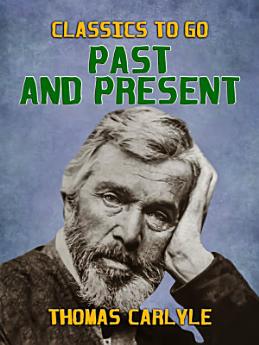Past and Present
Jul 2021 · Otbebookpublishing
Ebook
304
Pages
family_home
Eligible
info
reportRatings and reviews aren’t verified Learn More
About this ebook
Past and Present is a book by Thomas Carlyle.[1] It was published in April 1843 in England and the following month in the United States. It combines medieval history with criticism of 19th-century British society. Carlyle wrote it in seven weeks as a respite from the harassing labor of writing Cromwell. He was inspired by the recently published Chronicles of the Abbey of Saint Edmund's Bury, which had been written by Jocelin of Brakelond at the close of the 12th century. This account of a medieval monastery had taken Carlyle's fancy, and he drew upon it in order to contrast the monks' reverence for work and heroism with the sham leadership of his own day.
About the author
Thomas Carlyle (1795-1881) was a Scottish philosopher, satirical writer, essayist, historian, and teacher whose works profoundly influenced the 19th century. Born in Ecclefechan, Dumfriesshire, Carlyle's early life was marked by a rigorous education and a deep immersion in the Scottish Enlightenment. He initially pursued a career in the clergy but soon turned to literature, where his sharp wit and penetrating insights found a more fitting outlet.Carlyle's literary contributions are vast and varied, spanning historical studies, social criticism, and philosophical essays. His work often grappled with the tumultuous changes of the Industrial Revolution, critiquing the dehumanizing aspects of mechanization and advocating for a return to spiritual and moral values. His distinctive style, characterized by dense, vivid prose and a penchant for dramatic, almost prophetic declarations, set him apart from his contemporaries.One of Carlyle's most notable controversies was his infamous pamphlet "Occasional Discourse on the Negro Question" (1849), which espoused views that are now widely condemned for their racist overtones. Despite this, his influence on contemporary writers like Ralph Waldo Emerson and John Ruskin was profound, shaping the intellectual landscape of the time.Carlyle championed revolutionary ideas, particularly the notion of the "Great Man" theory, which posited that history is shaped by the actions of extraordinary individuals. This concept resonated deeply during an era of rapid change and upheaval, offering a counter-narrative to the growing emphasis on democratic and collective movements.In his personal life, Carlyle's marriage to Jane Welsh Carlyle was both a source of inspiration and turmoil, marked by intense intellectual partnership and emotional strife. Their extensive correspondence offers a window into the complexities of their relationship and the broader Victorian society in which they lived.Thomas Carlyle remains a figure of enduring fascination, his works continuing to provoke and inspire debate among scholars and readers alike.
Rate this ebook
Tell us what you think.
Reading information
Smartphones and tablets
Install the Google Play Books app for Android and iPad/iPhone. It syncs automatically with your account and allows you to read online or offline wherever you are.
Laptops and computers
You can listen to audiobooks purchased on Google Play using your computer's web browser.
eReaders and other devices
To read on e-ink devices like Kobo eReaders, you'll need to download a file and transfer it to your device. Follow the detailed Help Center instructions to transfer the files to supported eReaders.







